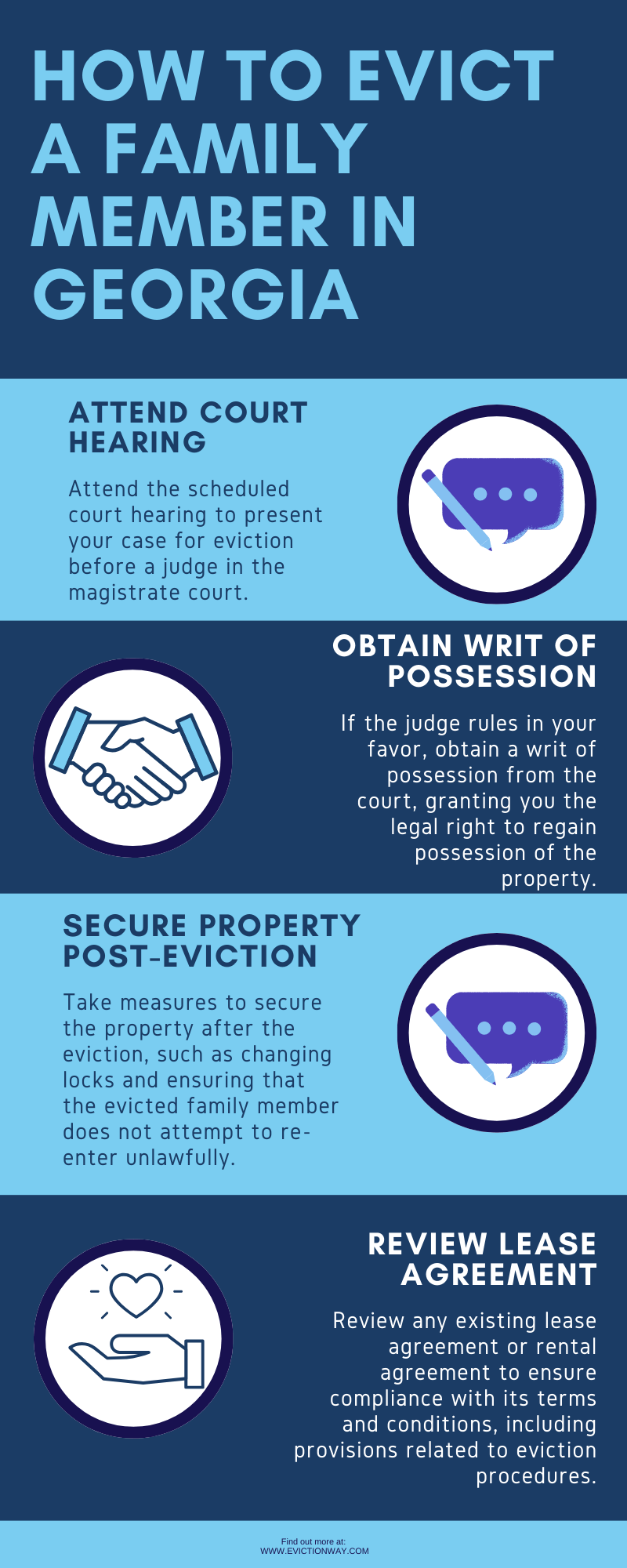Evicting a family member can be a difficult and emotional process, but it may be necessary to protect your rights and property. If you’re in Georgia and need to evict a family member, this blog post will provide you with the information you need.
We’ll share the best way to evict a family member in Georgia, including the legal steps you need to take. We’ll also provide tips on how to remove a family member politely and how to avoid any legal complications.
Whether you’re dealing with a difficult family member or simply need to enforce your rights as a property owner, this blog post will provide you with the information you need to evict a family member in Georgia.

How To Evict a Family Member In Georgia
Evicting a family member can be a difficult and emotional process. However, it is important to remember that you have the right to protect your property and your rights as a landlord. If you are considering evicting a family member, it is important to follow the proper legal procedures.
1. Give Proper Notice
The first step in evicting a family member is to give them proper notice. In Georgia, you must give your tenant at least 60 days’ notice to vacate the property. The notice must be in writing and must state the reason for the eviction.
2. File a Complaint with the Court
If your tenant does not vacate the property after you have given them notice, you will need to file a complaint with the court. The complaint should state the reason for the eviction and the steps you have taken to resolve the issue.

3. Attend a Hearing
Once you have filed a complaint, the court will schedule a hearing. At the hearing, you will have the opportunity to present your case to the judge. The judge will then make a decision about whether or not to evict your tenant.
4. Obtain a Writ of Possession
If the judge rules in your favor, you will be issued a writ of possession. This document gives you the legal authority to remove your tenant from the property.
5. Enforce the Writ of Possession
Once you have obtained a writ of possession, you can have it enforced by the sheriff. The sheriff will remove your tenant from the property and return it to you.
6. Seek Legal Advice
Evicting a family member can be a complex and challenging process. It is important to seek legal advice from an experienced attorney to ensure that your rights are protected.

How Much Does it Cost to Evict a Family Member in Georgia?
Georgia law does not provide specific guidance on the costs associated with evicting a family member. However, the general process of eviction in Georgia involves several steps, each of which may incur costs. These steps include:
| Expense Category | Approximate Cost Range | Notes |
|---|---|---|
| Court Filing Fee | $50 to $75 | Varies by county. |
| Service of Process | $25 to $50 | For serving the eviction notice to the family member. |
| Attorney Fees | $500 to $10,000 | Depends on case complexity and attorney’s rate. |
| Set-Out Fee (if applicable) | $25 to $75 | Fee paid to the sheriff’s department for physical eviction. |
| Locksmith (if needed) | $160 | To change the locks after the eviction is complete. |
| Storage of Belongings (if needed) | Varies | If there’s a requirement to store the family member’s belongings. |
| Lost Rent (opportunity cost) | Varies | Account for the potential rent lost during the eviction process. |
| Repairs and Cleaning | Varies | Costs for property cleaning and damage repair after eviction. |
| Miscellaneous Expenses | Varies | Additional costs such as late fees, court expenses, etc. |
- Filing a dispossessory warrant: This is the initial step in the eviction process and typically costs around $60.
- Serving the warrant: The sheriff or a private process server must serve the warrant to the family member, which can cost around $20.
- Holding a hearing: A hearing will be held in court to determine whether the eviction is justified. The cost of the hearing will vary depending on the complexity of the case.
- Obtaining a writ of possession: If the court rules in favor of the landlord, a writ of possession will be issued, which authorizes the sheriff to remove the family member from the property. The cost of the writ of possession is typically around $75.
In addition to these costs, there may also be other expenses associated with the eviction process, such as attorney fees, court costs, and moving expenses. The total cost of evicting a family member in Georgia can vary significantly depending on the specific circumstances of the case.
FAQs: Evicting a Family Member in Georgia
Evicting a family member can be a difficult and emotional process, but it is sometimes necessary to protect your rights and property. If you are considering evicting a family member in Georgia, here are five of the most frequently asked questions:
What are the grounds for evicting a family member in Georgia?
In Georgia, you can evict a family member for any of the following reasons:
- Nonpayment of rent
- Violation of the lease agreement
- Causing damage to the property
- Engaging in criminal activity
- Threatening or harassing other tenants
How do I start the eviction process?
To start the eviction process, you must first give your family member a written notice to vacate. The notice must state the reason for the eviction and the date by which your family member must leave. If your family member does not vacate the property by the deadline, you can file a dispossessory action in court.
What is a dispossessory action?
A dispossessory action is a legal proceeding that allows you to evict a tenant from your property. The process begins by filing a complaint with the court. The complaint must state the reason for the eviction and the amount of rent that is owed, if any. The court will then schedule a hearing to determine whether you are entitled to evict your family member.

What happens at the eviction hearing?
At the eviction hearing, you will have the opportunity to present your case to the judge. Your family member will also have the opportunity to present their case. The judge will then make a decision based on the evidence presented.
What if my family member does not leave the property after the eviction hearing?
If your family member does not leave the property after the eviction hearing, you can ask the court to issue a writ of possession. A writ of possession is a court order that authorizes the sheriff to remove your family member from the property.
Related:
